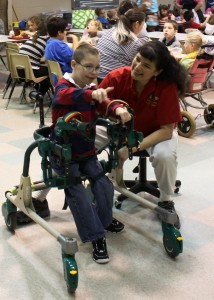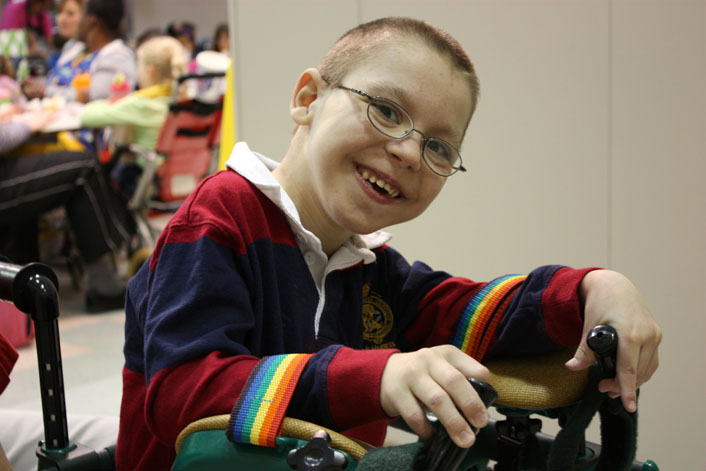Story By Vanessa Mosharaf
Photos By Sarah Griffith
When Hilary Gill walks into room 120 at South Bosque Elementary, she is greeted with a huge smile and an enthusiastic “Giillll!”
It’s just Ben. Again. One of her favorites.
As the physical therapist for Midway Independent School District, Hilary visits the special education programs at each school to work with students with physical disabilities. Hilary works with students like 8-year-old Ben, who has cerebral palsy, to enable them to perform day-to-day activities most people take for granted, like sitting on the ground or getting in and out of a chair.

Being a physical therapist is just one of the many roles Hilary plays. As a mother, when Hilary walks into her home after a long day, she never knows what will greet her. A ‘Hey, Mom’? A hug? Or maybe nothing at all. At least with Ben she knows what to expect.
In many ways Nick, Hilary’s son, is like every other 17-year-old boy. He loves video games, hates English class, is involved in his church youth group and school choir, and has a new favorite food every year. Although many people he sees on a daily basis don’t know, there’s no doubt that Nick sees the world through very different eyes.
Nick grew up doing everything his older brother Matthew did. When he needed something, Matthew was there to speak up. But when Matthew, who’s 21 months older, went to preschool, Hilary noticed something was different about Nick.
“Nick would just lie around,” Hilary said. Or, instead of playing pretend like most children his age, “he would take a book off the shelf and just page through it for like two hours.”
When she spoke to him, Hilary said she felt as if he was looking through her, like he couldn’t hear what she was saying. So she and her husband, John, decided to have his hearing tested. What they learned changed their lives.
Their precious 4-year-old had autism.
“At first, it’s as if the child you thought you had died,” Hilary said. “When you have a child, you have expectations and dreams for them and then when they tell you he has autism, it just wipes that out. And it’s not like you don’t have any [expectations]; you just don’t know what they are.”
Although autism has come into the public eye in recent years, 13 years ago, John explained, there wasn’t much information on treatment, which made Nick’s diagnosis even more difficult. To cope, the family turned inward.
“We leaned on each other a lot; we leaned on God a lot,” John said.
For a time, anger, depression and uncertainty crowded Hilary’s thoughts. She grieved the loss of her child, until one day things turned around.
“I remember looking at Nicolas as he was sitting at the table doing a Blue’s Clues drawing and I just thought, ‘Maybe you still have unlimited potential. We just have to find it,’” she said.
From that point on, autism was no longer a diagnosis, but a way of life. The family, with Hilary as the front-runner, became Nick’s biggest advocates to make sure he had every opportunity to grow. Hilary quit her previous job to work for the school district just so she could be on Nick’s schedule. The family drove hours every weekend to speech therapy programs and Hilary became an expert in communicating with her son whose words seemed “locked inside.”
In fourth grade, Nick outgrew the special education program and learned to communicate well enough for regular education classes. Knowing she couldn’t always protect him from bullies, Hilary never kept him from doing anything he wanted to do, even if she knew it could hurt. When Nick wanted to ride the bus in middle school, she put her fears aside and let him.
“I was a walking social blunder,” Nick said of his middle school years.
Often the victim of ridicule because of his differences, Nick dealt with bullies the only way he knew how. One day on the bus to school a boy asked him, “Are you retarded?” Nick didn’t respond. But when asked, “Do you even know what that means?” Nick gave him a dictionary definition of the word, which promptly shut the bully up.
“If you think about it, that was a really good response,” Nick said. “They use ‘[retarded]’ for everything; it’s just a filler word.”
Stories like that make it impossible not to see the positives of what is often looked at as just a disability. Having autism gives Nick a unique perspective and because Hilary works so hard to equip him with the tools to communicate, he is able to share it with others.
One person Nick has never had a hard time communicating with is his brother and best friend, Matthew. According to Matthew, their bond goes beyond brotherhood to a relationship in which words aren’t necessary, but when used are powerful. Autism has made honesty part of Nick’s genetic code, Matt explained, taking their mutual understanding for each other to a level of trust he’s experienced with no one else. One day while Matt was praying for Nick, he thanked God for both Nick’s strengths and weaknesses.
“He was stunned,” Matthew said, “that I would be thankful that he had autism and he wasn’t perfect at everything, but I meant it because it’s the fact that he has autism, the fact that he had those weaknesses, that made us so close.”
One thing he wished he could tell others, however, is not to consider him a “them,” but to realize that each person diagnosed with autism is unique. With an estimated one in 70 boys diagnosed with autism today, he couldn’t be more right.
The “autism spectrum,” Hilary explained, is so broad that it means something different in every diagnosis. Nick is considered “high-functioning,” which means that while he struggles with communication, many creative processes and social cues, his intelligence is unaffected, if not above average. To illustrate, Nick describes himself a “left-brain thinker” who thrives in a structured world.
As Nick struggles with “finding stuff to say,” Hilary has had to learn to speak Nick’s languageand appreciate what he has to offer. As a woman in an all-male household, she often craves the communication that doesn’t come naturally to Nick, but she takes comfort in knowing the emotions, although hidden, are there.
“When he was little, I would just hold him in my coat waiting for the school bus and I would pray over him,” she said. “One day I was holding him, and I said, ‘Oh, Nick, I just love hugging you. I love you. Do you love me?’ And he said, ‘I’m just using you for warmth,’” she remembered, laughing. “I’ll take that,” she added with a smile.
Since life is rarely as structured as he would like, Nick finds solace in what comes naturally to him: music.
As a member of the award-winning Midway High School choir, Nick’s deep bass voice helps him fulfill a leadership role in ways he cannot fulfill socially. Midway High School Choral Director Jeff Rice explained that with perfect pitch, Nick is able to “notice the slightest inconsistencies of pitch in other people” and act as a guide for those around him.
Choir is more than just a hobby for Nick; it’s a chance to bond with his classmates. According to Rice, these classmates “look up to him because of the gift he has. They respect it.”
“He’s fearless,” Rice said. “Some of that comes from a lack of awareness that he’s supposed to be afraid, but he just will do anything. That’s a strength.”
One talent Nick’s classmates are often amazed with is his uncanny ability to read music backwards and forwards.
“Give him a song and he can sing it backwards without hesitation,” Matthew said. “That’s not normal.”
Even more amazing to Matthew is the humility Nick has maintained throughout his success. In fact, the first time Nick sang at church, it wasn’t stage fright that made him tell his mother he never wanted to do it again. It was the reaction from audience members who bombarded him with words of praise after the service, using speaking voices much higher than normal conversation.
Since then, like all things out of his comfort zone, receiving praise became something Nick practiced. After several rounds of faked high-pitched squeals from his dad, Nick now accepts the high pitches for what they truly mean.
What Hilary learns as a parent she takes to the classroom. She said it’s important to find the balance between helping her students cope and pushing them to go farther. Her goal is always to enable them to adapt to the world, rather than limit their capabilities. She believes there should be an expectation for a child to grow. She wants parents and teachers to empower their students, not limit them. It’s this philosophy that makes her a favorite among students and teachers alike.
Ben, for example, has already exceeded expectations, and every day he achieves more independence and class involvement.
“I think he feels proud of himself for accomplishing things that they do,” Ben’s mom, Ashley Ballew, said.
As a parent who sees both sides of the education system, Hilary said it frustrates her when parents place limits on what she can expect from her students. Seeing firsthand what Nick has been able to accomplish, she knows that all children are capable of growth.
“Sometimes there’s an expectation that the school should adapt for the child,” Hilary said. “That’s not a good thing to teach your child because school prepares them for life and there’s no way the whole world is going to adapt to your child.”
In many ways, Nick’s diagnosis has dictated Hilary’s life. Desperate to be a part of his world, she devoted all she could to helping him.”When you’re child has autism, your work is cut out for you, but it’s worth it because your child is worth everything,” she said.
Ultimately, Nick’s autism has taught Hilary to cherish the smaller victories in life.
“The rewards are great,” she said. “You get to see miracles in everything they do. I remember the first time Nick carried a gallon of milk, the first time he spoke, the first time we had a conversation.”
Today, those miracles may go beyond what she thought was probable, but never impossible. Her ability to see the unlimited potential in her son and students gives meaning to her work and new meaning to life for a child with a physical disability.



